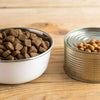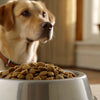Should I Feed My Senior Dog Wet or Dry Food? Understanding the Best Nutrition Choices for Aging Canines
- Houndsy
Table of Contents
- Introduction
- Understanding Nutritional Needs of Senior Dogs
- Dry Food: Pros and Cons
- Wet Food: Pros and Cons
- Making the Right Choice for Your Senior Dog
- Enhance the Feeding Experience with Houndsy
- Conclusion
Introduction
Did you know that around 50% of dogs over the age of 10 suffer from some form of dental disease? This statistic underscores the importance of choosing the right type of food for our senior companions. If you're asking yourself, "Should I feed my senior dog wet or dry food?" you're not alone. Many pet parents grapple with this decision as they strive to provide the best care for their aging pets.
As dogs age, their bodies undergo numerous changes that can influence their health and dietary requirements. This blog post will explore critical factors influencing the choice between wet and dry food for senior dogs. By the end, you will have insights into the nutritional needs of older dogs, the benefits and drawbacks of both food types, and practical tips for transitioning your dog’s diet to meet their evolving requirements. We will also highlight how our product, the Houndsy Kibble Dispenser, enhances the feeding experience for your cherished pet.
Understanding Nutritional Needs of Senior Dogs
As dogs mature, they experience a range of changes that can significantly impact their nutritional requirements. Here are some key areas to consider:
Decreased Metabolism
Senior dogs typically exhibit a decline in metabolism, meaning they may require fewer calories than they did during their younger years. However, providing high-quality nutrients is essential to maintain their muscle mass and overall health. Proper nutrition can help prevent obesity, a common issue in senior dogs.
Dental Health Concerns
Many senior dogs face dental problems that may make chewing dry food difficult or painful. Conditions such as periodontal disease can lead to tooth loss, making wet food a more appealing and practical option for these pets. Regular dental check-ups with a veterinarian are vital in monitoring your dog’s oral health and making necessary dietary adjustments.
Digestive Changes
Aging can also affect a dog's digestive system. Senior dogs may experience constipation or other gastrointestinal issues, which can influence their food choices. Foods high in fiber or those containing added moisture can help alleviate these issues, making wet food an attractive option.
Joint and Mobility Issues
Arthritis and other joint problems are common in older dogs, making it crucial to choose a diet that supports joint health. Foods containing omega-3 fatty acids, glucosamine, and chondroitin can be beneficial. Wet food may also be easier for dogs with mobility issues to consume, as they may not want to bend down to a bowl.
Cognitive Function
Just like humans, dogs can experience cognitive decline as they age. Nutritional support, including antioxidants and omega-3 fatty acids, can play a role in promoting brain health. These nutrients can be found in both dry and wet dog foods, but the overall palatability of wet food may encourage consumption in dogs that are less motivated to eat.
Dry Food: Pros and Cons
Dry dog food, or kibble, has been a staple in canine diets for decades. While it has its advantages, there are also limitations to consider.
Advantages of Dry Dog Food
- Dental Health Benefits: The crunchy texture of kibble can help reduce plaque and tartar buildup on teeth, contributing to better oral health for dogs who chew it thoroughly.
- Convenience: Dry food is easy to store, measure, and serve. It can be left out for longer periods without spoiling, making it suitable for dogs that prefer to graze.
- Cost-Effective: Generally, dry dog food is more economical than wet food, especially when feeding large breeds or multiple dogs.
- Portion Control: Dry kibble allows for easy portion adjustments based on your dog's weight and activity level.
Disadvantages of Dry Dog Food
- Dental Challenges: For senior dogs with dental issues, kibble may be difficult to chew, leading to frustration or refusal to eat.
- Lower Moisture Content: Dry food typically contains about 10% moisture, which may not provide adequate hydration, especially for dogs that do not drink enough water.
- Less Palatable: Many senior dogs may find dry food less appealing, particularly if they have diminished taste or smell as they age.
Wet Food: Pros and Cons
Wet dog food, commonly found in cans or pouches, presents a different set of benefits and challenges for senior dogs.
Advantages of Wet Dog Food
- Higher Moisture Content: Wet food contains approximately 75-80% moisture, providing additional hydration, which is crucial for senior dogs that may not drink enough water.
- Enhanced Flavor and Aroma: The stronger smell and taste of wet food can entice even the pickiest eaters, making it an excellent choice for dogs with reduced appetites.
- Easier to Chew: For dogs suffering from dental issues or mobility problems, wet food is easier to chew and swallow, ensuring they receive necessary nutrition.
- Nutrient-Rich Formulas: Many wet dog foods are specifically formulated to support the health of senior dogs, containing higher levels of protein and essential nutrients.
Disadvantages of Wet Dog Food
- Cost: Wet food is often more expensive than dry food, which can add up, especially for larger dogs or multiple pets.
- Storage and Spoilage: Once opened, wet food must be refrigerated and consumed quickly to prevent spoilage, which may not be convenient for all pet owners.
- Dental Health: While wet food can be easier for dogs to eat, it does not provide the same dental benefits as dry food, potentially contributing to plaque buildup.
Making the Right Choice for Your Senior Dog
Choosing between dry and wet food for your senior dog isn't a one-size-fits-all decision. Here are some key considerations to help you make the right choice:
Assess Your Dog's Health
Before making any dietary changes, consult with your veterinarian. They can evaluate your dog’s overall health, dental condition, and specific nutritional needs. Factors such as existing health issues, weight, and mobility should guide your decision.
Consider a Combination
Some pet parents opt for a combination of both dry and wet food. Mixing kibble with wet food can provide the texture variety that many dogs enjoy while also delivering hydration and nutrient density. This approach can be particularly beneficial for seniors, allowing you to cater to their preferences while ensuring they receive balanced nutrition.
Transitioning Foods
When transitioning your dog to a new diet, it’s important to do so gradually. A sudden change in diet can lead to digestive upset. We recommend mixing the new food with the old food over a period of about 7-10 days to allow your dog to adjust.
Enhance the Feeding Experience with Houndsy
We at Houndsy understand that feeding time should be a joyful experience for both dogs and their owners. Our flagship product, the Houndsy Kibble Dispenser, is designed to make feeding convenient and enjoyable. With features such as perfect portion control, a stylish mid-century modern design, and ergonomic functionality, our dispenser elevates the daily feeding ritual while keeping your dog's diet consistent and healthy.
Key Features of the Houndsy Kibble Dispenser
- Perfect Portion Control: Say goodbye to overfeeding and mess. Our dispenser delivers precise portions every time.
- Ergonomic Design: The convenient crank is positioned at standing height, eliminating the need for bending and making feeding easier for both you and your dog.
- Large Storage Capacity: With a capacity of 25-30 lbs, you can store enough food for your furry friend while keeping it fresh with a BPA-free liner.
- Auto-Locking Mechanism: The dispenser features an auto-locking mechanism to prevent accidental dispensing by curious pets or toddlers.
To explore how the Houndsy Kibble Dispenser can enhance your dog's feeding experience, visit our product page here.
Conclusion
Deciding whether old dogs should eat dry or wet food ultimately depends on their individual needs, health conditions, and preferences. As we have explored, both dry and wet food have distinct advantages and disadvantages that warrant careful consideration. By understanding your dog’s unique dietary requirements and consulting with your veterinarian, you can provide them with a balanced diet that supports their health and well-being in their golden years.
Reflecting on your own pet's eating habits, how do you think their diet could be improved? Whether you choose dry food, wet food, or a mix of both, we encourage you to explore innovative feeding solutions like the Houndsy Kibble Dispenser to enhance your dog's feeding experience.
Frequently Asked Questions
How much should you feed your senior dog?
The appropriate amount of food depends on various factors, including your dog's age, weight, activity level, and overall health. Consult your veterinarian for specific recommendations tailored to your senior dog's needs.
Do seniors need low-protein dog food?
Contrary to popular belief, many senior dogs benefit from higher protein levels to maintain muscle mass. Consult your veterinarian to determine the best protein levels for your dog.
What are the best ingredients for senior dog food?
Look for high-quality sources of protein, easily digestible carbohydrates, healthy fats, and essential vitamins and minerals. Ingredients that support joint health, such as glucosamine and omega-3 fatty acids, are also beneficial.
Should I choose wet or dry food for my senior dog?
The choice depends on your dog's preferences, dental health, and specific dietary concerns. Many pet parents find success with a combination of both wet and dry food.
Are there any dietary considerations or supplements for senior dogs?
Some senior dogs may require reduced-calorie foods to manage weight, while others may benefit from added fiber for digestion. Supplements like glucosamine, omega-3 fatty acids, and antioxidants can also be beneficial for their overall health.












